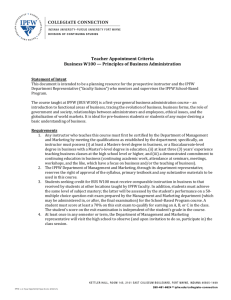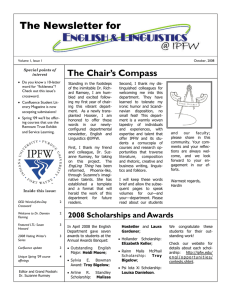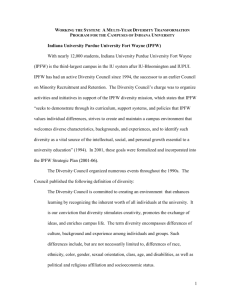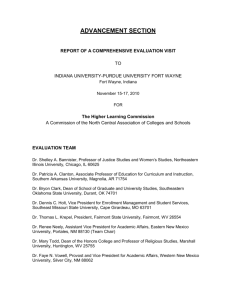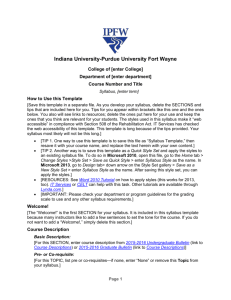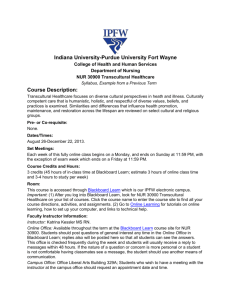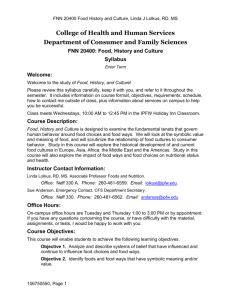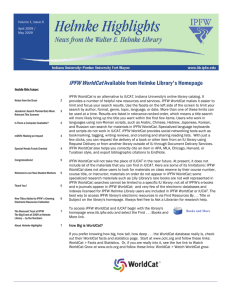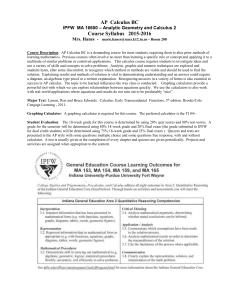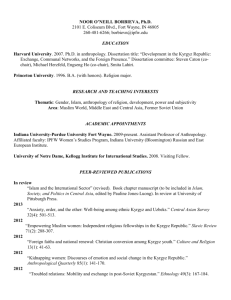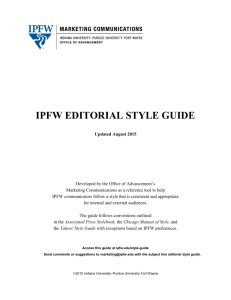IPFW Educational Travel Program Proposal Outline
advertisement
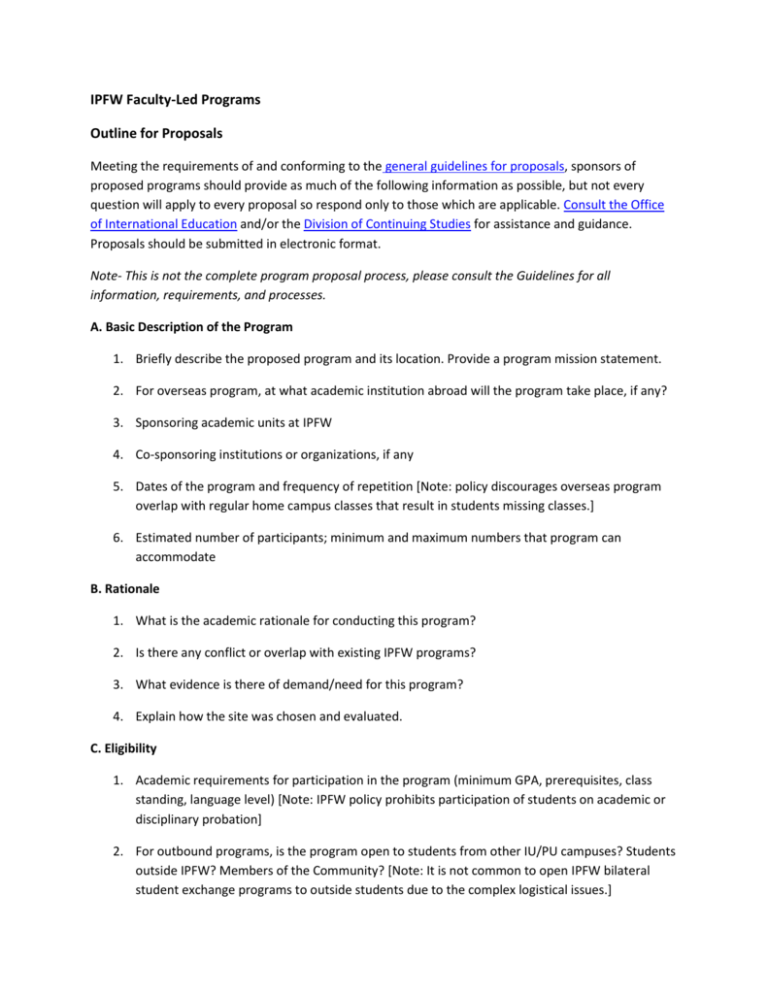
IPFW Faculty-Led Programs Outline for Proposals Meeting the requirements of and conforming to the general guidelines for proposals, sponsors of proposed programs should provide as much of the following information as possible, but not every question will apply to every proposal so respond only to those which are applicable. Consult the Office of International Education and/or the Division of Continuing Studies for assistance and guidance. Proposals should be submitted in electronic format. Note- This is not the complete program proposal process, please consult the Guidelines for all information, requirements, and processes. A. Basic Description of the Program 1. Briefly describe the proposed program and its location. Provide a program mission statement. 2. For overseas program, at what academic institution abroad will the program take place, if any? 3. Sponsoring academic units at IPFW 4. Co-sponsoring institutions or organizations, if any 5. Dates of the program and frequency of repetition [Note: policy discourages overseas program overlap with regular home campus classes that result in students missing classes.] 6. Estimated number of participants; minimum and maximum numbers that program can accommodate B. Rationale 1. What is the academic rationale for conducting this program? 2. Is there any conflict or overlap with existing IPFW programs? 3. What evidence is there of demand/need for this program? 4. Explain how the site was chosen and evaluated. C. Eligibility 1. Academic requirements for participation in the program (minimum GPA, prerequisites, class standing, language level) [Note: IPFW policy prohibits participation of students on academic or disciplinary probation] 2. For outbound programs, is the program open to students from other IU/PU campuses? Students outside IPFW? Members of the Community? [Note: It is not common to open IPFW bilateral student exchange programs to outside students due to the complex logistical issues.] D. Orientation Programming 1. For outbound programs, describe the pre-departure orientation (how many sessions; who will conduct them; content). The Office of International Education will assist in conducting all predeparture orientation programs for outbound programs. 2. Describe the on-site orientation (who will conduct it; content). Distinguish between academic preparation sessions and those that focus on logistics. E. International Academic Programs [Note: Proposals for inbound non-credit programs need only respond to item E.8] 1. Briefly describe the overall instructional program 2. How many credits will each participant be required to take? 3. Indicate whether students will be enrolled in: 1. Courses taught by an accompanying U.S. faculty member 1. Provide syllabi for courses that will be taught and the IPFW equivalent course number for each. 2. Provide CV and/or list of qualifications for each program leader. 2. Regular host university courses 1. Provide description of university, range of courses offered, and illustrative courses descriptions. 3. Special courses for international students taught by host country faculty 1. Provide course descriptions for courses that will be taught and the IPFW equivalent course number for each. 2. Provide CV’s and/or list of qualifications of instructors. 4. Which major, distribution or other requirements can be satisfied on the program? 5. Outline the instructional schedule and provide the classroom contact hours [Note: IPFW travel courses involve 12.5 hours in a classroom setting per 1 credit hour and incorporate lab hours at a 50% value. Therefore, pedagogical time outside of a classroom setting (museum tours, meetings with local authorities, etc.) should probably be factored in at a 2:1 ratio.] Create a pedagogical chart to show classroom hour equivalencies. See this example for help. See some additional guidance on planning time abroad from IU. 6. Describe classroom or other teaching facilities on site 7. Who will determine students’ grades and on what basis? 8. If non-credit, describe the program's purpose and activities F. Student Learning and Development 1. Describe how the program will bring participants into direct contact with the host culture in meaningful ways. 2. Indicate how the program incorporates the program site into its pedagogy. 3. How will the program link discipline-specific learning outcomes to the location of the program? 4. How will the program provide language development appropriate to the mission of the program? 5. How might you build in reflection exercises so that students become more aware of the cultural differences around them and how they are responding to them? (Research has shown that when program interventions take place – such as reflection assignments – students experience deeper learning. For examples, see the faculty toolkit from the University of Kentucky.) 6. Describe how the students' international experiences will be integrated upon return to campus (re-entry activities, student publications, exhibits, etc.). G. Support Services For Outbound Programs 1. Will there be a U.S. faculty resident director on site? Please note that if the faculty or staff member does not have additional on-site staffing, he/she must attend to a wide range of student issues, including logistical, academic, personal, medical and emergency response. (Some program models provide for additional on-site support to handle these circumstances.) There will be resource materials and an annual workshop for those who have received approval to teach for or direct a program. It is recommended that all programs include two responsible individuals so that there is always someone on hand to deal with crisis matters. The second-in-command might be another faculty member, a staff member or an advanced graduate student. Is the IPFW faculty or staff member prepared for the responsibilities associated with education abroad programs? 2. If there will not be a U.S. faculty resident director, describe the office or individual overseas who will address students’ logistical, academic, personal, medical, and emergency concerns. For Inbound Programs 1. Will there be a resident director from the partner institution or organization on site at IPFW? Is the IPFW sponsoring faculty or staff member and academic or administrative office prepared for the responsibilities associated with hosting the program? 2. If there will not be a resident director from the partner institution or organization on site at IPFW, describe the office or individual who will address students’ logistical, academic, personal, medical, and emergency concerns and communicate them to a liaison at the home institution or organization. H. Health, Safety and Security For outbound programs, review the complete Country Specific Information Sheet(s) for your destination(s) at the Web site of the U.S. Department of State and the Health Information for Travelers of the Centers for Disease Control and respond to issues raised. Note: Except in special circumstances, IPFW will not offer or support study abroad in countries that are under a State Department Travel Warning. Request for exemptions based on "special circumstances" are evaluated on a program-by-program basis through a process established by the Purdue University Office of International Programs. Reminder: As needed, program leaders are required to consult the Institutional Review Board (IRB) about Human Subjects Research. All IPFW investigators (including students) who are engaged in human subjects research while abroad remain accountable to the Purdue Institutional Review Board (IRB) and Purdue’s Human Research Participant Program, Office of Research Administration. It is advised that all forms be completed before departure since email signatures are not legally acceptable. Contact IRB https://www.irb.purdue.edu/ for more detailed information about conducting international human subjects research. The IPFW IRB Liaison is available to help human subjects researchers at IPFW as they prepare IRB applications for submission and respond to recommendations from Purdue. For questions, please contact IPFW Office of Research Engagement and Sponsored Programs. resp@ipfw.edu (260) 481-6971 What safety and security preparation will be provided for the group? What security measures will be taken on their behalf? I. Supplementary Activities Describe excursions or group activities and how they directly complement the academic program. J. Room and Board Describe student housing accommodations and meal arrangements in detail. K. Student Budget 1. What fee will IPFW charge for this program? 2. What costs will the IPFW fee include? (fees to host institution, room & board, health insurance, excursions, books and other materials) 3. If not included in the IPFW fee, what are estimated costs for room and board, personal expenses and international airfare? Financial Aid Budget Form for students to use at the Financial Aid Office L. Program Budget Contact the Office of International Education and the Division of Continuing Studies for assistance in preparing a realistic budget projection. You will need to consider costs for the following: Salaries for instructional and/or support staff Staff travel to program site Staff displacement allowance Tuition & fees Fees for use of instructional space Administrative costs (publicity, office expenses) Group excursions (bus rental, hotels, guides, admission fees, etc.) Student housing (if paid through program fee) Student meals (if included in program fee) Note that although each program operates a little differently, there are some general financial rules that apply. Each program should plan accordingly to make payments in advance or to make financial resources available for accompanying staff members to pay for various program expenses as they arise. Please note that University policies prohibit mixing personal and program funds, so you should not count on using your own personal bank account as a vehicle for transferring funds abroad. As per University policy, all funds payable and receivable must flow through accounts established and managed by the Division of Continuing Studies. M. Program Administration Describe the procedure for registering students, collecting fees, paying program costs, enrolling participants in student health insurance, conducting checks of academic and disciplinary records, collecting and retaining documents (Agreement and Release forms, emergency contact information, medical history forms), etc. Who will establish program policies, including withdrawal and refund policies? Who will establish the protocol for behavioral expectations, including developing a clear definition of behavior that warrants dismissal of a student from the program?
